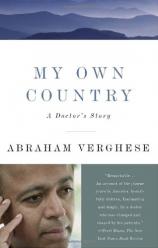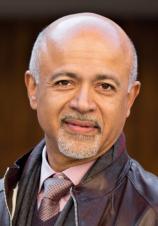Reading Group Guide
Discussion Questions
My Own Country

1. Verghese describes the early eighties, before AIDS had spun out of control, as "a time of unreal and unparalleled confidence, bordering on conceit, in the Western medical world," [p. 24] in which doctors felt they had achieved "mastery over the human body" [p. 25]. How does the reality of AIDS undermine this ultra-modern, technological ideal of medicine? How does Verghese's idea of the doctor's role change during the course of the narrative? Do you believe that his turning back toward the older ideal of treating the whole patient, body and soul, might be a harbinger of a general medical trend?
2. When Verghese arrives in Johnson City, he says, "I knew no openly gay men. I only knew the stereotype" [p. 23]. What changes does his attitude toward homosexual men undergo during his years at the Miracle Center? How does Verghese's initial perception of himself as an outsider in Johnson City make him especially sensitive to his patients' problems with their families and community?
3. Johnson City in the mid-eighties is "a place where Jerry Falwell's pronouncement that homosexuals would 'one day be utterly annihilated and there will be a celebration in heaven' was taken as a self-evident truth" [p. 56]. Yet when AIDS strikes people they love, many inhabitants of Johnson City prove remarkably supportive. How does their personal contact with the disease work to falsify the "gay" stereotype they previously held? Does Verghese, simultaneously, succeed in breaking stereotypes about "Falwell country" that readers themselves might hold? What other stereotypes does Verghese undermine in his story?
4. Verghese's story indicates that to feel part of a group is vital to human survival and well-being. How do the various groups Verghese describes--the gay community, the TAP support group, the church, the medical fraternity, the expatriate Indian community--nourish and strengthen their members? Are they always nurturing, or do they also put up barriers between their members and the outside world? Is Verghese himself fully a member of, fully at home in, any of these groups?
5. How do the different members of Gordon's family react to his homosexuality and illness? How does each, in his or her different way, cope with Gordon's condition? In what way does Gordon typify the "generation of young men, raised to self-hatred" and their collective "voyage, the breakaway, the attempt to create places where they could live with pride" [pp. 402-403]?
6. "I heard different but strangely similar versions of this story from families of gay men: There was always the God-given talent that accompanied their God-given sexuality, always the special creativity and humor" [p. 92]. Verghese speculates on two possibilities: these qualities might be as biologically determined as sexuality, or they might be developed to compensate for the men's essential difference. What do you think of these ideas?
7. What is Verghese's reaction to Gordon's and Will's visions of Jesus? How does religion affect the way these patients deal with their disease? Does it help them to fight? Does it help them to come to terms with defeat? Does it ever hinder them from facing their problems truthfully?
8. Verghese comes to see AIDS "as the litmus test for nurses and physicians, a means of identifying who would and who wouldn't" [p. 105] provide treatment and, in so doing, risk their own health. Is there an excuse for the hostile attitude of nurses who don't want to treat AIDS patients? Should people who have committed themselves to careers as doctors or nurses be morally obligated to treat any and every patient? In Johnson City, just how deeply does the hospital staff's attitude towards AIDS change over the course of the four years Verghese describes?
9. When Ethan Nidiffer explains why he didn't alert his dentist to the fact that he was HIV-positive, Verghese admits that he "could certainly see his point of view" [p. 306]. What is your point of view on this issue? How much responsibility lies with the patient, and how much with the dentist? Should patients always be obliged to inform their doctors that they are HIV-positive, even if that means they may not find treatment?
10. How do Gordon, Fred, Ethan, and Raleigh differ in their visions of themselves as gay men and as part of a larger gay community? Can you see any parallels with Verghese and his own search for a community, a home?
11. Will and Bess Johnson see themselves as "innocent victims" of the disease--as opposed, by implication, to the gay men who also suffer from it. How might you explain Verghese's complex reaction to this notion? Do the Johnsons strike you as essentially more "innocent" than the gay men in the narrative? This issue relates to the way the cancer patients at the VA hospital are perceived as dying with honor, while so many HIV patients harbor feelings of shame. How are the concepts of honor and shame, innocence and guilt, addressed by the TAP members? By the Johnsons? By Rajani? By Verghese himself? Do these attitudes reflect those of the larger American culture?
12. Do you agree with Bess and Will's decision that secrecy about their HIV infection was vital? Why were they so overwhelmingly concerned with secrecy? What makes them able to draw comfort from their church even while assuming that their fellow church-goers would not stand by them in their illness? Do you blame Bess and Will for not speaking out and trying to help others who suffer from the disease, or do you think that they had every right to their privacy?
13. Because of his work, Verghese comes to believe that "our moments of true safety are rare." Is such a knowledge a handicap, or can it bring increased strength? How does the enormous change in Vickie McCray's life and character relate to this knowledge?
14. Do you believe that the situation Verghese describes in Johnson City accurately represents the situation for AIDS sufferers in the United States as a whole? If you have any experience with the disease, do you find that patients feel isolated, feel the need to keep their condition a secret? In your own community, does compassion outweigh prejudice? Are there adequate support resources for the HIV-positive? How do different members of the local and national government treat this volatile issue?
15. At the end of the book, Verghese states that AIDS work will always be his vocation. How does Verghese's powerful sense of mission and his unselfish giving of himself affect his family life? Is the sort of schedule he has undertaken necessarily incompatible with a full family life? How might a busy doctor's wife and children share in his professional life?
16. When Verghese arrives in Johnson City, he feels he has found a home, his "own country" [p. 46]. Does he still see it in this way at the end of the book? If so, why does he leave? How does the Malcolm Cowley poem placed at the beginning of the narrative apply to Verghese's personal quest?
My Own Country
- Publication Date: April 25, 1995
- Paperback: 432 pages
- Publisher: Vintage
- ISBN-10: 0679752927
- ISBN-13: 9780679752929







